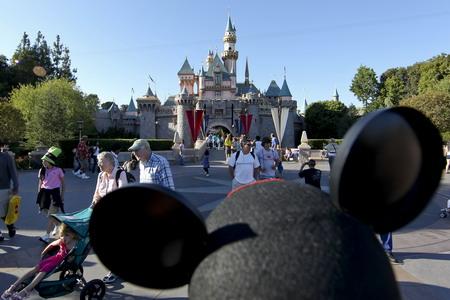
A patron wearing a Mickey Mouse hat walks in front of Sleeping Beauty Castle at Walt Disney Co's Disneyland amusement park in Anaheim, California. The number of Chinese tourists to the US is set to pass the 1 million mark by the end of this year. [Photo / Bloomberg]
Chinese travelers stateside to pass 1 million mark by end of yearBEIJING/New York - Thousands of Chinese tourists will spend the Christmas holiday period in the United States this year.
New York City, California, and Hawaii are among the more popular destinations as organizations such as United Airlines, Disneyland Park in California, the California Travel and Tourism Commission and the Hawaii Tourism Authority have been begun promoting luxury tours.
"The American tours for the coming holidays are the most luxurious and comfortable ones since the US opened as a tourist destination for Chinese citizens in 2008," said Liu Chuang, manager of the American marketing department of byecity.com, one of the biggest online tourist agencies in China.
As a result, the number of Chinese tourists to the US is set to pass the 1 million mark by the end of this year, the National Tourism Administration of China said. And the 2 million mark is likely to be passed in 2015, the State agency said.
Guo Jianing, vice-general manager of Total Travel International Travel Services Co Ltd, said that thanks to the increase in personal income and the depreciation of the dollar, outbound tourism for his company has risen 30 percent this year.
Jiang Yiyi, from the center for recreation and tourism research at Peking University, said outbound tourists are generally well educated, with at least a 5,000-yuan ($750) monthly income, and are aged from 25 to 44.
"They speak English and use the Internet. These tourists are also willing to try new things," she said.
Jiang's research shows that most Chinese spend more on shopping than on transport, accommodation and food on overseas trips.
The World Tourism Organization said China became the fourth-largest outbound consumer in the world last year, with the number of Chinese outbound tourists passing 47 million, 4 percent up year-on-year.
Christopher Heywood, vice-president of travel and tourism public relations of NYC & Company, said the number of Chinese visitors to New York ranked 17th in 2009, but they are among the biggest spenders. Last year, they spent $236 million, or $172 a person a day, in the city, he said.
Macy's statistics shows that of its 10 discount cards in various languages, the one in Chinese achieves the highest sales per transaction, with each worth nearly $200.
Brian Chuan from Macy's said Chinese consumers love to buy bags, shoes and make-up.
Zhao Xinxin found paradise on Fifth Avenue, spending a few hours there, and $3,000 in a Gucci store.
"I would have spent twice as much in China," said Zhao, 30, who was in the US on a tour with her company COFCO Group, China's largest grain trader.
Lou Yun, 27, who works in a New Jersey law firm, said the service in department stores is much better than in China, adding that he's made to feel "very welcome" in "fancy stores".
"You will not experience the same in China. They seem arrogant and cold."
Lou said the attitude toward Asians has changed in recent years, probably because of their enormous spending power.
In addition, more and more Mandarin-speaking people have been hired to help Chinese tourists in stores and some tourist attractions. Some ATMs even provide services to China UnionPay cardholders.
"You don't have to be worried even if you can't speak English, because there are people who can speak Chinese always available to help you out," said Shi Yi, a Chinese tourist shopping at a Coach store.
The Empire State Building has audio tours in Mandarin. "We recognize the importance of the Chinese market by taking consideration of their special needs," said Jean-Yves Ghazi, director of the Empire State Observatory.
The building attracts more than 3.5 million visitors a year, with about 200,000 Chinese. It also hosts special events such as lighting-up the top of the building in red and gold - the colors of prosperity and good luck - to honor the Spring Festival.
Top hotels in the US are also working to attract more Chinese by offering special services. For example, the Marriott Marquis in Times Square has a Chinese breakfast and facilities for guests to brew tea in their room.





